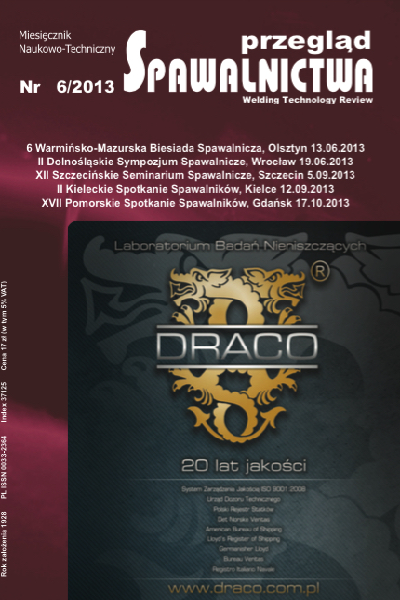Wpływ płomienia acetylenu, propanu i metanu do podgrzewania wstępnego na właściwości stali drobnoziarnistej
##plugins.themes.bootstrap3.article.main##
Abstrakt
Wykonano próby podgrzewania kilku gatunków stali do różnych wartości temperatury, mające na celu określenie skuteczności i wydajności ww. paliw gazowych oraz rozpoznanie ich potencjalnie szkodliwych skutków dla właściwości materiału. Badano możliwość wykorzystania poszczególnych gazów do ogrzewania, suszenia i podgrzewania wstępnego. Omówiono wpływ gazów na tworzenie się wody kondensacyjnej na powierzchni podgrzewanych elementów i w konsekwencji na ich korozję. Najlepszym gazem okazał się acetylen. Badania właściwości mechanicznych oraz próba twardości wykazały, że podgrzewanie nie powoduje szkodliwych skutków dla obrabianych materiałów, a zwłaszcza kruchości wodorowej. Stwierdzono, że podgrzewanie wstępne jest procesem niezbędnym w przetwórstwie stali konstrukcyjnych o podwyższonej i wysokiej wytrzymałości.
Effect of acetylene, propane and methane flame for preheating on the fine-grained steel properties
Abstract
The paper presents results of tests of several kinds of steels heating to various temperatures, to determine the effectiveness and efficiency of acetylene, propane and methane flame as gaseous fuels and to identify their potentially harmful effects on the properties of the material. Investigated the possibility of using different gases for heating, drying and preheating. The influence of various gases on the formation of condensation water on the surface of heated elements, and consequently on their corrosion. The most preferred gas was acetylene. The study of the mechanical properties and hardness test showed that the heating does not cause the expected adverse effects on treated materials, particularly hydrogen embrittlement. It was found that preheating is necessary in the manu- facturing process strengthen structural steels and high strength steels.
Pobrania
##plugins.themes.bootstrap3.article.details##
Creative Commons CC BY 4.0 https://creativecommons.org/licenses/by/4.0/
Artykuły czasopisma Welding Technology Review (Przegląd Spawalnictwa) publikowane są w otwartym dostępie na licencji CC BY (licencja Creative Commons Uznanie autorstwa 4.0 Międzynarodowe). Licencja CC BY jest najbardziej otwartą dostępną licencją i uważaną za „złoty standard” w formule otwartego dostępu; jest również preferowany przez wielu fundatorów badań. Licencja ta umożliwia czytelnikom kopiowanie i redystrybucję materiału na dowolnym nośniku i w dowolnym formacie, a także zmienianie, przekształcanie lub budowanie na nim materiału, w tym do użytku komercyjnego, pod warunkiem wskazania oryginalnego autora.
